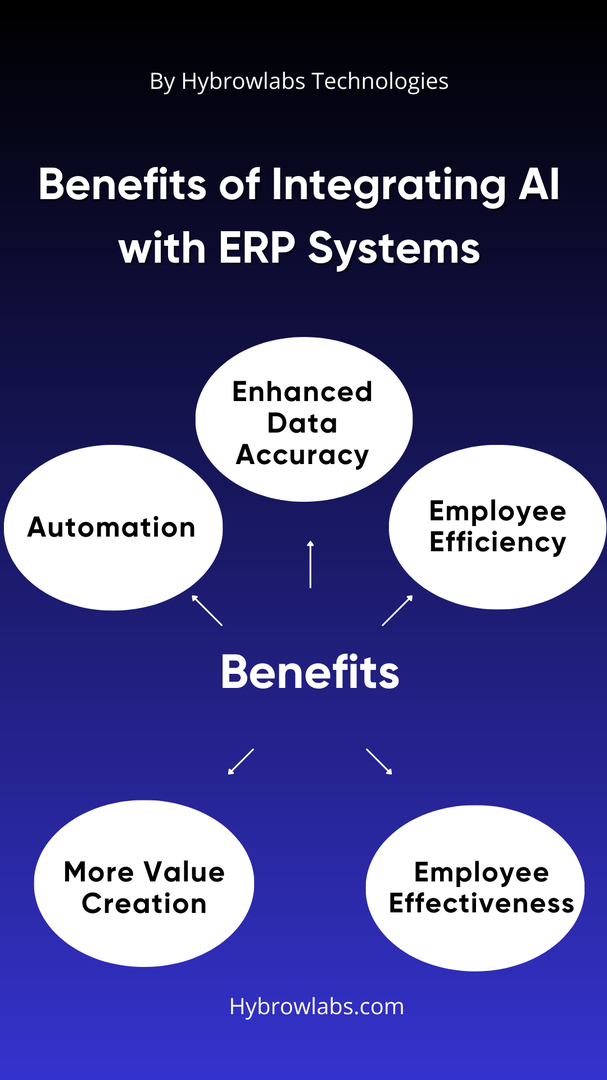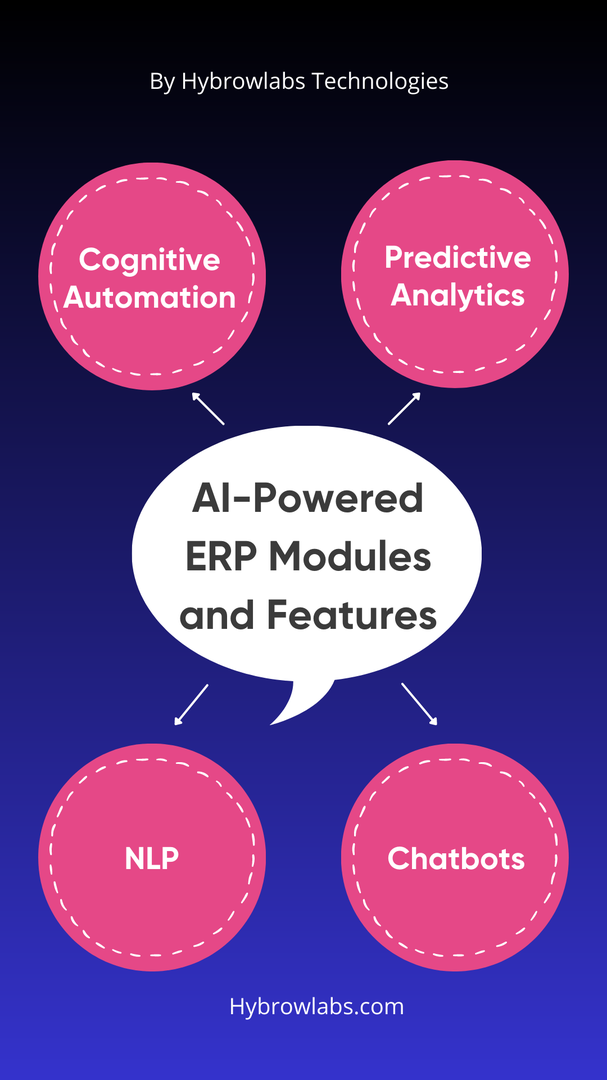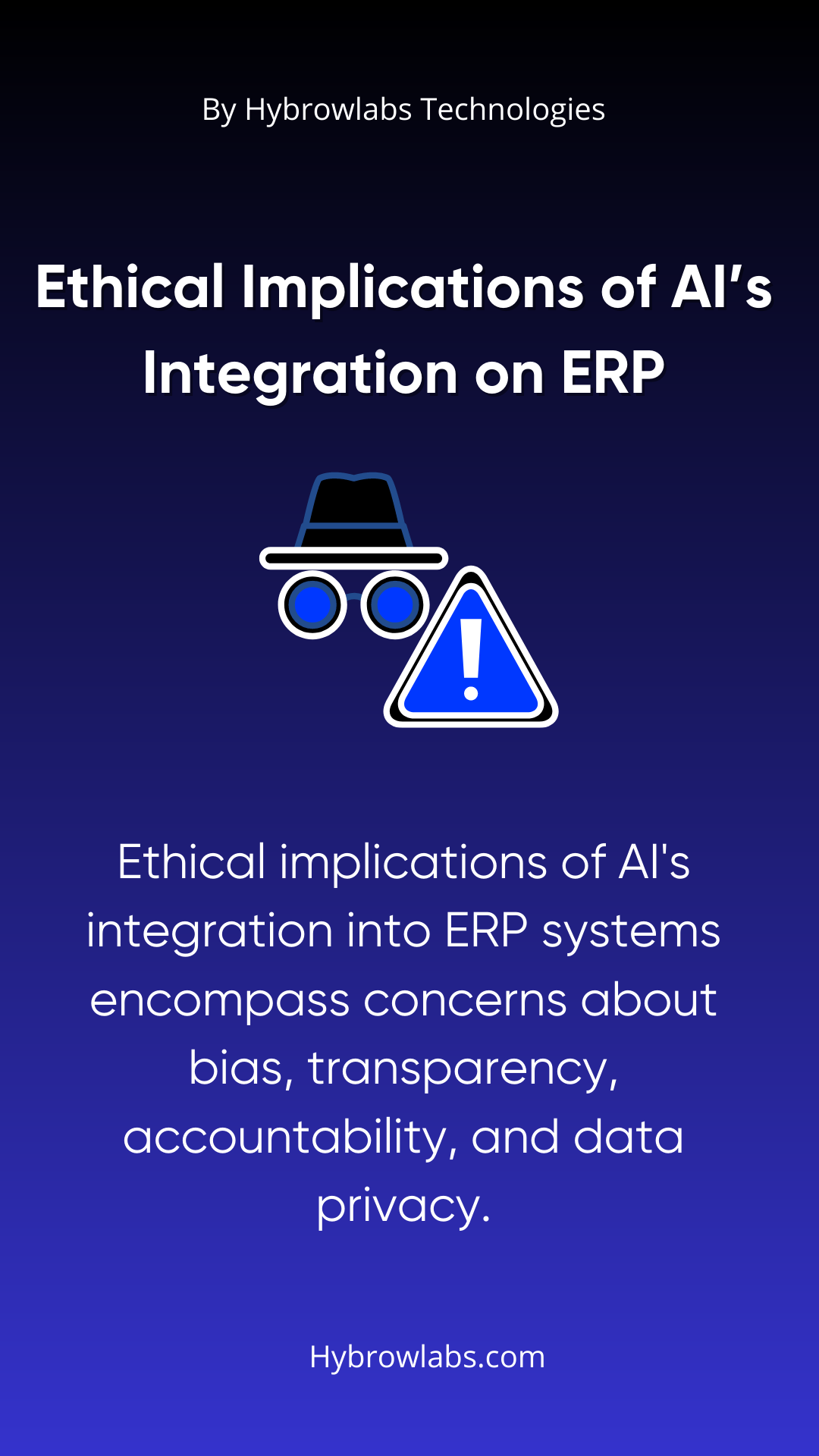Enterprise Resource Planning (ERP) systems are the digital backbone of modern businesses. These comprehensive software solutions are designed to streamline and integrate various core functions and processes across an organization. From managing finances and human resources to supply chain operations and customer relationships, ERP systems serve as centralized hubs that enable efficient data flow and decision-making.
In today's fast-paced and data-driven business landscape, ERP systems are the key to enhancing operational efficiency, improving resource allocation, and facilitating informed strategic decisions. Today in this article we will learn more about ERP Systems, the Benefits of Integrating AI with ERP Systems, AI-powered ERP Modules and Features, The Future of AI-ERP Integration, and many more. So are you interested in knowing more about these, are you excited to bring more value to your business with efficiency? Then let’s get started!
Understanding ERP Systems
ERP systems are the digital command centers of modern enterprises, simplifying operations and combining multiple activities into an integrated unit. ERP is a kind of software system that helps organizations in managing fundamental business activities such as accounting, manufacturing, sales, and human resources. ERP systems are often made up of a collection of modules that work together to share data and create a unified view of the organization.
ERP systems can help with efficiency, productivity, and decision-making. They can also assist organizations in meeting regulatory requirements and improving customer service.
Benefits of Integrating AI with ERP Systems

1. The Value of Data:
- Enhanced Data Accuracy: AI-powered algorithms can cleanse and formalize data, reducing errors and assuring the integrity of information within the ERP system.
- Real-time Data Processing: AI enables ERP systems to process extensive amounts of data in real time, assuring that decisions are based on the most up-to-date information.
2. Employee Efficiency:
- Automated Routine Tasks: AI can automate repetitive and mundane tasks within the ERP, freeing up employees to focus on more strategic and value-added activities.
- Efficient Resource Allocation: AI-driven recommendations in ERP systems can optimize resource allocation, ensuring that personnel are utilized effectively.
3. Employee Effectiveness:
- Personalized Workflows: AI can create personalized workflows for employees based on their roles and responsibilities, improving task prioritization and efficiency.
- Training and Development: AI can suggest training and development opportunities for employees based on their performance data, facilitating skill improvement.
4. More Strategic Results:
- Predictive Analytics: AI-driven ERP systems can provide predictive insights, helping businesses anticipate market trends, demand fluctuations, and other factors that inform strategic decisions.
- Scenario Planning: AI can simulate various scenarios, allowing organizations to assess the potential impact of different strategies and make informed choices.
5. More Value Creation:
- Enhanced Customer Insights: AI-powered ERP systems can analyze customer data to provide insights that lead to personalized product recommendations and improved customer experiences.
- Innovative Product Development: By analyzing market trends and customer feedback, AI can guide product development efforts, increasing the likelihood of creating products that resonate with customers.
6. Automation:
- Workflow Automation: AI can automate complex workflows, reducing the need for manual intervention in processes like order fulfillment, invoice processing, and inventory management.
- Chatbots and Virtual Assistants: AI-driven chatbots integrated into ERP systems can handle routine customer inquiries, improving customer service efficiency.
7. Data Analysis and Decision-Making:
- Advanced Analytics: AI-powered ERP systems offer advanced analytics capabilities, enabling businesses to gain deeper insights from their data and make data-driven decisions.
- Prescriptive Insights: AI not only provides descriptive analytics (what happened) but also prescriptive insights (what to do) by analyzing historical data and predicting future outcomes.
The Impact of AI on ERP Integration in Different Industries:
In today's rapidly evolving business landscape, the integration of Artificial Intelligence (AI) with Enterprise Resource Planning (ERP) systems stands as a beacon of transformation. This synergy isn't limited by industry boundaries; it's reshaping how diverse sectors operate. Let’s see how AI-ERP integration is transforming different industries.
1. Healthcare:
AI-ERP integration enhances patient care, resource optimization, and decision-making, leading to better outcomes and reduced costs.
Example: In a hospital, AI-powered ERP predicts patient admissions based on historical data, weather conditions, and disease trends. This ensures adequate staffing levels, optimal bed allocation, and timely care. Patients experience reduced wait times, improved service quality, and the hospital reduces operational costs.
2. Retail:
AI-powered ERP systems improve inventory management, boost sales, and deliver personalized shopping experiences, fostering customer loyalty.
Example: A retail chain integrates AI into its ERP system for demand forecasting. AI analyzes historical sales data, market trends, and even external factors like weather. The result is optimized inventory levels, reducing excess stock and markdowns. Customers benefit from consistent product availability, leading to increased sales and improved customer satisfaction.
3. Manufacturing:
AI-ERP integration minimizes downtime lowers maintenance costs and enhances productivity by enabling predictive maintenance.
Example: In a manufacturing plant, AI-driven ERP predicts equipment failures. Sensors on machines continuously monitor performance, detecting anomalies. When the system identifies a potential issue, it alerts maintenance teams. This proactive approach reduces unplanned downtime, increases machinery lifespan, and ultimately improves production efficiency and profitability.
4. Finance:
AI-ERP integration enhances security, reduces fraud, and improves customer trust through real-time fraud detection.
Example: A bank deploys AI-driven ERP modules to monitor transactions. The system uses machine learning to analyze transaction patterns and locations in real time. When it detects an unusual transaction, such as a large withdrawal in a foreign country, it triggers an alert. Prompt action prevents fraud, protecting both customers and the bank's reputation while instilling trust.
5. Agriculture:
AI-ERP integration in agriculture increases crop yields, conserves resources, and promotes sustainable farming practices.
Example: A modern farm implements AI-ERP integration for precision farming. Soil sensors and weather data feed into the ERP system, which controls irrigation and fertilization. The result is optimized resource usage, reduced water and fertilizer consumption, and higher crop yields. This sustainable approach benefits both the environment and the farm's bottom line.
These are just a few examples of how AI is being used to improve ERP systems in different industries. As AI continues to develop, it is likely to have an even greater impact on ERP systems in the years to come.
AI-Powered ERP Modules and Features: Transforming Business Operations:

1. Predictive Analytics:
- Enhanced Forecasting: AI-powered predictive analytics within ERP systems enable businesses to forecast demand, inventory levels, and sales more accurately. This, in turn, helps optimize inventory management and reduce carrying costs.
- Reduced Downtime: Predictive maintenance capabilities leverage AI to anticipate equipment failures, allowing companies to perform maintenance before issues lead to costly downtime.
2. Chatbots and Virtual Assistants:
- Improved Customer Service: AI-driven chatbots integrated into ERP systems provide 24/7 customer support. They can handle routine inquiries, order status checks, and FAQs, freeing up human agents for more complex tasks.
- Efficient Issue Resolution: Chatbots can swiftly troubleshoot and resolve common problems, reducing response times and enhancing customer satisfaction.
3. Natural Language Processing (NLP):
- Streamlined Data Entry: NLP technology allows users to interact with the ERP system using natural language queries and commands, simplifying data entry and retrieval processes.
- Advanced Search: NLP enables more intuitive and precise searches within ERP databases, facilitating quicker access to critical information.
4. Cognitive Automation:
- Process Automation: AI-driven cognitive automation can handle end-to-end processes, from invoice processing to employee onboarding, reducing manual intervention and errors.
- Intelligent Routing: It can intelligently route tasks and requests to the appropriate personnel or departments, ensuring efficient workflow management.
5. Personalized Dashboards:
- Customized Insights: AI-powered ERP systems can create personalized dashboards for users, presenting relevant data and insights based on their roles and responsibilities. This enhances decision-making by focusing on what matters most to each user.
- Real-time Alerts: Users receive real-time alerts and notifications tailored to their needs, ensuring they are promptly informed of critical developments or issues.
6. Fraud Detection:
- Enhanced Security: AI algorithms within ERP systems continuously monitor transactions and data for anomalies, flagging potential fraud or security breaches. This proactive approach helps protect the organization's financial integrity.
- Reduced Risk: Early detection of fraudulent activities reduces financial and reputational risks associated with fraud.
The Future of AI-ERP Integration
1. Enhanced Predictive Capabilities:
AI-Driven Predictive ERP: ERP systems will become even more adept at predicting future trends, demand fluctuations, and potential disruptions. Businesses will rely on AI to optimize inventory, production schedules, and supply chain operations with unprecedented precision.
2. Hyper-Personalization:
Tailored User Experiences: ERP systems will use AI to create hyper-personalized interfaces, dashboards, and reports for users. These interfaces will adapt to individual roles and preferences, making data-driven decision-making more intuitive and effective.
3. Augmented Analytics:
AI-Enhanced Analytics: The integration of AI into ERP will result in augmented analytics that not only provides insights but also suggests actions. These AI-driven recommendations will guide users toward optimal decisions, transforming data analytics into a more actionable tool.
4. Conversational Interfaces:
Conversational ERP: Natural Language Processing (NLP) and AI-driven chatbots will play a more prominent role in ERP interfaces. Users will interact with their ERP systems through voice or text conversations, making data retrieval and task execution more conversational and user-friendly.
5. Cross-Platform Integration:
Unified Data Ecosystems: AI-powered ERP systems will seamlessly integrate with other business applications and platforms, creating unified data ecosystems. This integration will enable real-time data sharing and decision-making across the organization.
6. Autonomous Operations:
AI-Driven Autonomy: ERP systems will become more autonomous in managing routine processes. They will self-optimize inventory, automate financial reporting, and initiate actions based on AI-driven insights, reducing the need for human intervention.
7. AI-Driven Compliance:
Regulatory Compliance: AI will play a vital role in ensuring ERP systems remain compliant with evolving regulations and data privacy laws. Continuous monitoring and proactive compliance management will become standard.
8. Sustainability and Ethical AI:
AI for Sustainability: ERP systems will use AI to track and optimize resource usage, reducing environmental impact. Ethical AI principles will guide decision-making, ensuring fairness and transparency.
9. AI-Powered Decision Support:
Real-time Decision Support: AI will provide decision-makers with real-time, data-driven insights and recommendations, empowering them to make informed choices faster and with greater confidence.
10. Industry-Specific Solutions:
Tailored Solutions: AI-ERP integration will become more industry-specific. Businesses will adopt ERP systems with AI functionalities customized for their unique requirements, enabling deeper industry insights and efficiencies.
Ethical Implications of AI’s Integration on ERP:

1. Bias and Fairness:
AI algorithms can inadvertently perpetuate biases present in historical data, potentially leading to unfair or discriminatory outcomes. It's essential to address bias by regularly auditing AI models, using diverse training data, and employing fairness-aware algorithms.
2. Transparency:
AI algorithms can be complex and opaque, making it difficult for users to understand how decisions are made. Implementing transparency features in ERP systems, such as providing model explanations, decision logs, and clear communication about AI usage, is crucial.
3. Accountability:
Determining responsibility in case of AI-related errors or harm can be challenging. Clear lines of accountability within the organization should be established, along with protocols for handling errors, security breaches, or ethical violations.
4. Data Privacy:
AI relies on data, and mishandling data can lead to privacy breaches. Compliance with data protection regulations like GDPR is necessary, along with robust data privacy practices, including encryption, access controls, and data anonymization.
If you are interested in Frappe's security features check this out.
Conclusion-
In conclusion, the relationship between Artificial Intelligence (AI) and Enterprise Resource Planning (ERP) systems is poised to reshape the way businesses operate, making them more efficient, agile, and intelligent. As we've discussed the various aspects of this transformation, it's essential to emphasize the importance of responsible AI-ERP integration.
Hybrowlabs, an expert software development farm in the field of AI and ERP integration, is the best solution for all of your business problems regarding AI-ERP integration. Our expertise in navigating ethical considerations, and ensuring transparency will give the best solution for you. As we peer into the future, it's clear that AI will be a driving force behind innovation and progress in the business world. This is not just a transformation; it's a reimagining of what's possible. So contact us now and witness the immense growth in your business.
FAQ:
1. What is the relationship between AI and ERP systems?
AI enhances ERP systems by providing advanced data analysis, predictive capabilities, automation, and improved decision-making.
2. How does AI enhance the functionality of ERP systems?
AI enhances ERP functionality through features like predictive analytics, chatbots, natural language processing, and data analysis, making processes more efficient and data-driven.
3. What are the key benefits of integrating AI with ERP systems?
Benefits include improved data accuracy, enhanced employee efficiency, better decision-making, cost savings, automation, and the ability to create more value for customers.
4. What are some real-world examples of AI transforming ERP systems?
Examples include predictive maintenance in manufacturing, chatbots for customer service, and personalized product recommendations in retail.
5. How does AI improve data accuracy and analysis within ERP systems?
AI cleanses and normalizes data, reduces errors, and enables real-time data processing, leading to more accurate and insightful analytics.



.png)


a3dc85.jpg)

.jpg)
fd8f11.png)

.jpg)
.jpg)